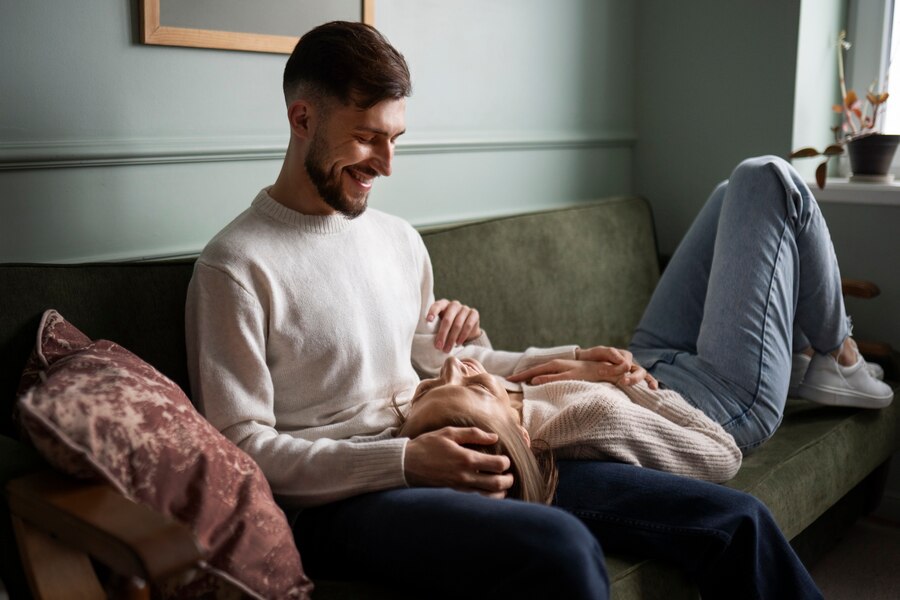Together We Soar: Empowering Relationships Through Couples Rehab Journeys
Couples rehabs represent a paradigm shift in addiction treatment, acknowledging that the path to recovery can be more effective and enduring when traveled together. By focusing on the couple as a unit, these rehabs provide a supportive environment where both partners can heal individually and collectively. The essence of couples rehabs lies in fostering mutual support, enhancing communication, and rebuilding trust—key elements that are often eroded by substance abuse. In Orange County, couples rehabs offer specialized programs tailored to address the unique needs and dynamics of couples seeking recovery together.
In the following sections, we will provide a comprehensive understanding of what couples rehabs entail, the journey to recovery within these programs, and the profound empowerment and growth that couples can achieve. From initial assessments to long-term sobriety, this article aims to offer an insightful look into how couples can soar together, overcoming the challenges of addiction and emerging stronger than ever.
Couples Rehabs Services 888-325-2454
Understanding Couples Rehabs
Couples rehabs represent a progressive and holistic approach to addiction treatment, where the focus extends beyond the individual to include their significant other. This method acknowledges the intricate dynamics of relationships and aims to heal both partners simultaneously, fostering a supportive environment conducive to sustained recovery.
Definition and Purpose
Couples rehabs are specialized treatment programs designed to address substance abuse issues within the context of a romantic relationship. Their primary purpose is to provide a unified path to recovery that not only tackles individual addiction problems but also strengthens the relationship as a whole. By treating both partners together, these programs aim to break the cycle of addiction and build a foundation for healthy, mutually supportive relationships.
Types of Programs Available
There are several types of programs available in couples rehabs, each tailored to meet the unique needs of different couples. Some of the common formats include:
- Inpatient Programs: These intensive programs require couples to reside at the treatment facility, providing a structured environment where they can fully immerse themselves in the recovery process. Inpatient programs offer 24/7 medical and emotional support, making them ideal for couples with severe addiction issues.
- Outpatient Programs: Outpatient programs offer more flexibility, allowing couples to continue their daily responsibilities while attending scheduled treatment sessions. This format is suitable for those with less severe addictions or for couples who have completed an inpatient program and require ongoing support.
- Individual and Couples Therapy: These programs often incorporate a combination of individual therapy sessions and joint counseling. By addressing personal issues and relationship dynamics concurrently, couples can work on their recovery while simultaneously improving their communication and problem-solving skills.
Key Benefits for Couples
Couples rehabs offer numerous benefits that can significantly enhance the recovery journey:
- Mutual Support: One of the most significant advantages is the mutual support partners can provide each other. Facing the challenges of addiction together can reinforce commitment to recovery and reduce feelings of isolation.
- Improved Communication: These programs often include therapy sessions that focus on enhancing communication skills, helping couples to express their needs and concerns more effectively. Improved communication can reduce conflicts and build a stronger, more understanding relationship.
- Shared Goals: Working towards a common goal of sobriety can strengthen the bond between partners. Couples rehabs help partners align their objectives, creating a unified front in the battle against addiction.
- Relapse Prevention: By involving both partners in the treatment process, couples rehabs can better identify and address potential triggers and stressors within the relationship. This comprehensive approach can significantly reduce the risk of relapse.
- Holistic Healing: Couples rehabs often integrate various therapeutic techniques, including cognitive-behavioral therapy, family counseling, and holistic therapies such as yoga and meditation. These diverse methods address the physical, emotional, and psychological aspects of addiction, promoting overall well-being for both partners.
Understanding the unique offerings and benefits of couples rehabs is crucial for couples seeking a collaborative approach to overcoming addiction. By addressing both individual and relational issues, these programs pave the way for a healthier, more fulfilling life together.
The Journey to Recovery
Embarking on the journey to recovery through couples rehab is a transformative experience that involves several crucial stages. This journey is meticulously planned and executed to ensure both partners receive the support and guidance they need to overcome addiction while strengthening their relationship. Here is a comprehensive look at the different phases involved in the recovery process.
Initial Assessment and Planning
The journey to recovery begins with a thorough initial assessment. This step is vital as it helps tailor the rehabilitation program to meet the unique needs of both individuals and the couple as a unit. During the assessment, medical professionals, therapists, and counselors evaluate the couple’s physical and mental health, the nature and extent of their addiction, and their relationship dynamics. This evaluation often includes interviews, questionnaires, and sometimes physical examinations.
Based on the assessment, a personalized treatment plan is developed. This plan outlines the specific therapeutic approaches, timelines, and goals for the couple’s recovery journey. The initial planning phase sets the foundation for a structured and effective rehabilitation process, ensuring that both partners are aligned with their recovery objectives.
Therapeutic Approaches
Couples rehab programs employ a variety of therapeutic approaches designed to address both individual and relational aspects of addiction. These therapies are crucial in helping couples understand the root causes of their addiction, develop healthy coping mechanisms, and rebuild trust and communication within their relationship.
- Individual Therapy: Each partner participates in one-on-one therapy sessions with a trained counselor. These sessions focus on personal issues, traumas, and triggers that contribute to their substance abuse. Individual therapy allows for deep, personal healing and self-discovery.
- Couples Therapy: Joint therapy sessions are integral to the recovery process, as they address the relational dynamics affected by addiction. Couples learn effective communication techniques, conflict resolution strategies, and ways to support each other’s sobriety. The goal is to foster a healthy, supportive partnership that can withstand the challenges of recovery.
- Group Therapy: Group therapy provides a supportive community where couples can share their experiences and learn from others facing similar struggles. These sessions encourage empathy, reduce feelings of isolation, and build a network of support that extends beyond the rehab program.
- Behavioral Therapies: Techniques such as Cognitive Behavioral Therapy CBT) and Dialectical Behavior Therapy (DBT) are often employed to help couples modify harmful behaviors and thought patterns. These therapies equip couples with practical skills to manage stress, avoid relapse, and maintain a positive outlook on their recovery journey.
Support Systems and Aftercare
Recovery doesn’t end when the rehab program concludes. Establishing a robust support system and comprehensive aftercare plan is essential for long-term sobriety and relationship health.
- Support Systems: Couples are encouraged to build a network of support that includes family, friends, and support groups. Participation in community-based support groups such as Alcoholics Anonymous (AA) or Narcotics Anonymous (NA) can provide ongoing encouragement and accountability.
- Aftercare Programs: Effective aftercare plans are tailored to each couple’s needs and may include continued therapy, regular check-ins with a counselor, and participation in outpatient programs. Aftercare ensures that couples have the resources and support they need to navigate the challenges of life after rehab.
- Relapse Prevention: Couples are equipped with strategies and tools to prevent relapse. This includes identifying potential triggers, developing a crisis plan, and having access to emergency support if needed. Relapse prevention is a critical component of sustaining long-term recovery and ensuring the couple’s journey to empowerment continues uninterrupted.
The journey to recovery in couples rehab is a comprehensive, multifaceted process that addresses both the individual and relational aspects of addiction. By focusing on personalized treatment plans, therapeutic approaches, and robust support systems, couples are empowered to achieve lasting sobriety and build stronger, healthier relationships.

Empowerment and Growth
The journey through a couples rehab program is not merely about overcoming substance abuse; it is about transforming lives and relationships. Empowerment and growth are central to this transformative process, enabling couples to rebuild and fortify their bonds while fostering individual and collective well-being.
Building Stronger Relationships
One of the most profound outcomes of couples rehab is the strengthening of the relationship. Couples learn to communicate more effectively, resolve conflicts constructively, and support each other’s recovery journey. Through joint therapy sessions, they gain insights into each other’s experiences and triggers, fostering empathy and mutual understanding. This shared journey enhances emotional intimacy and trust, creating a resilient foundation for their future together. By addressing underlying issues and developing healthier interaction patterns, couples are better equipped to face life’s challenges as a united front.
Personal Development
While the primary focus of couples rehab is on the relationship, individual growth is equally paramount. Each partner is encouraged to embark on a path of self-discovery and personal development. This often involves identifying and addressing personal triggers, emotional wounds, and behavioral patterns that contribute to substance abuse. Individual therapy, workshops, and self-help groups provide the tools and support needed for personal healing and growth. As individuals grow stronger and more self-aware, they bring renewed energy and positivity to the relationship, creating a synergistic effect that benefits both partners.
Long-term Success and Sobriety
Empowerment in couples rehabs is also about equipping couples with the skills and resources needed for long-term success and sobriety. This includes developing a comprehensive aftercare plan that incorporates ongoing therapy, support groups, and other resources to help maintain sobriety. Couples are taught how to create a supportive home environment that encourages healthy habits and continuous growth. They learn to set realistic goals, celebrate milestones, and cope with setbacks constructively. By fostering a proactive and resilient mindset, couples can navigate the complexities of life post-rehab with confidence and determination.
In conclusion, empowerment and growth in couples rehab are about more than just recovery; they are about building a brighter, healthier future together. Through strengthened relationships, personal development, and a focus on long-term success, couples can emerge from rehab with a renewed sense of purpose and a deeper connection. Together, they soar to new heights, proving that with mutual support and dedication, a fulfilling and sober life is within reach.
Couples Rehabs’ Journey to Empowerment
The journey to recovery through couples rehabs is a testament to the power of partnership and mutual support. In facing the challenges of addiction together, couples find not only a path to sobriety but also an opportunity to strengthen their relationships and foster enduring personal growth. By understanding the unique needs of each couple, these specialized programs offer a tailored approach that addresses both individual and shared struggles.
From the initial assessment and personalized planning to the diverse therapeutic approaches and robust support systems, couples rehabs provide a comprehensive framework that nurtures resilience and fosters empowerment. The emphasis on building stronger relationships and facilitating personal development ensures that couples are equipped with the tools necessary for long-term success.
As couples navigate the complexities of recovery, they learn to communicate more effectively, support each other’s growth, and celebrate shared milestones. The transformative experience of couples rehab not only paves the way for a healthier, sober life but also lays the foundation for a deeper, more fulfilling partnership. By committing to this journey together, couples can truly soar, embracing a future defined by mutual empowerment and lasting sobriety.

- FAQ: What is the philosophy behind “Together We Soar: Couples Rehabs’ Journey to Empowerment”? Answer: “Together We Soar” embodies our approach to healing and growth for couples, fostering empowerment through support, therapy, and personalized treatment programs.
- FAQ: How does Couples Rehabs’ “Together We Soar” program benefit couples in recovery? Answer: “Together We Soar” provides a comprehensive and holistic approach, addressing the unique needs of each partner while promoting mutual understanding, trust, and empowerment.
- FAQ: What types of therapy are included in the “Together We Soar” program at Couples Rehabs? Answer: Our program integrates evidence-based therapies such as couples counseling, individual therapy, group sessions, and experiential activities to support the journey to empowerment.
- FAQ: Can “Together We Soar” help couples rebuild trust and communication? Answer: Absolutely, the program emphasizes rebuilding trust, enhancing communication skills, and fostering a deeper connection, essential for the journey to empowerment.
- FAQ: How long does the “Together We Soar” program typically last at Couples Rehabs? Answer: The duration varies based on individual needs, but the program is designed to provide a supportive environment for couples to progress towards empowerment on their unique journey.
- FAQ: Are there specific activities or workshops included in the “Together We Soar” program? Answer: Yes, the program incorporates workshops, relationship-building activities, mindfulness practices, and recreational therapy to enrich the journey to empowerment.
- FAQ: What sets “Together We Soar” apart from traditional rehab programs for couples? Answer: “Together We Soar” integrates personalized care, relationship-focused therapy, and empowerment strategies, creating a distinct and effective approach to couples’ rehabilitation.
- FAQ: How does Couples Rehabs’ “Together We Soar” program support individuals dealing with trauma or mental health challenges? Answer: The program addresses trauma, mental health concerns, and addiction-related issues through a tailored, compassionate approach, fostering empowerment within each partner.
- FAQ: Can couples in any stage of their relationship benefit from the “Together We Soar” program? Answer: Yes, the program welcomes couples at any stage, whether they are seeking to strengthen their relationship, heal from past wounds, or address addiction-related challenges.
- FAQ: Is the “Together We Soar: Couples Rehabs’ Journey to Empowerment” program customizable to meet the unique needs of each couple? Answer: Absolutely, the program is tailored to address the specific needs, goals, and dynamics of each couple, ensuring a personalized journey to empowerment.





Recent Comments